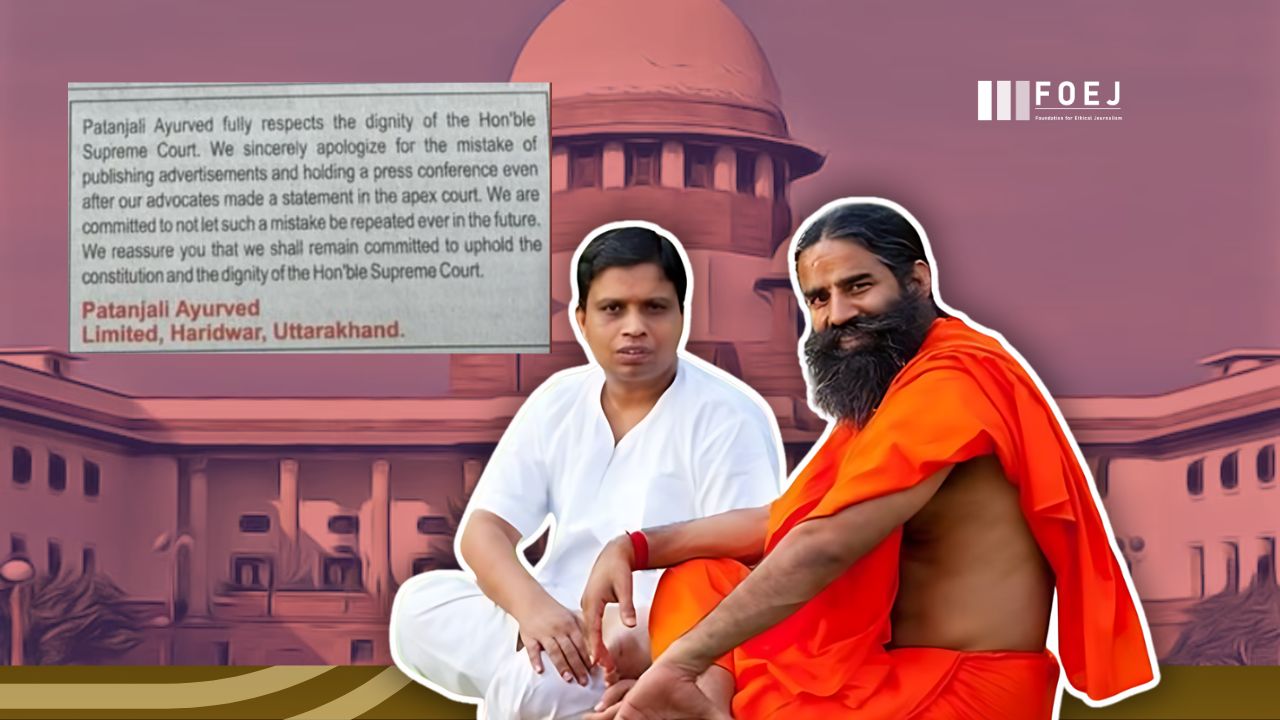Taking a hit on the size of the ads in the newspaper by Patanjali, the Supreme Court asserted that the apology size for “misleading advertisements” should have been bigger, prominent, and full-page as their advertisements of its products.
The petition was filed by the IMA regarding a smear campaign against the COVID-19 vaccination drive and modern medicine by the self-styled yoga guru and his company.
The bench, headed by Hima Kohli and Ahsanuddin Amanullah, asked why the apologies were filed yesterday and not earlier. Mr. Rohatgi, representing Patanjali Ayurveda’s founders, Baba Ramdev and Acharya Balkrishna, said the apology was published in 67 newspapers at a cost of ₹ 10 lakh. “Has the apology been published prominently? Same font and size as your earlier advertisements?” Justice Hima Kohli asked.
“No, milord… It costs a lot. Lakhs of rupees,” replied Senior Advocate Mukul Rohatgi. The court replied, “We are not bothered.”
An application was filed seeking a ₹ 1000 crore fine against the Indian Medical Association (IMA) for its case against Patanjali. The court noted, “Is it a proxy plea? We suspect,” the bench said, as Mr. Rohatgi stressed his clients have nothing to do with it.
The Bench asked for copies of the printed apologies to be submitted by Patanjali to the Court to examine the size of the apology.
“Please cut out the ads and then supply them to us. Do not enlarge them and supply them to us. We want to see the actual size. This is our direction… We want to see that when you issue an apology ad, it does not mean we have to see it through a microscope. It is not meant to be on paper but also read,” Justice Kohli said.
“Counsel for proposed respondents (Patanjali, Ramdev, and Balkrishna) submits that the apology was published in newspapers only yesterday, which is an unqualified apology. The said ads are not on record. The same has been collated and will be supplied during the day, and needful shall be done to supply it to the petitioners,” the Court recorded.
In the last hearing, Patanjali Ayurveda and its Managing Director, Acharya Balkrishna, unreservedly apologized to the Supreme Court for their ads. The firm claimed to have scientific evidence from clinical research done in Ayurveda that was not accessible at the time of the Drugs and Cosmetics Act of 1940.
Past Incidents
On February 27, during a hearing on a petition filed by the Indian Medical Association (IMA) regarding’misleading’ advertisements, a restriction on Patanjali Ayurveda’s marketing activities was imposed until further notice. In addition, the court ordered Patanjali not to make disparaging remarks about any medical system.
At the time, Justice Ahsanuddin Amanullah had remarked, “The entire country has been taken for a ride. You shut your eyes! For two years, you wait for this important thing when the Drugs Act itself says it’s prohibited?”
In November, the Supreme Court warned of imposing charges of ₹1 crore for each deceptive claim made in advertisements for Patanjali Ayurvedic remedies that promise to treat diseases.
The Court subsequently stated that the problem could not be reduced to a choice between allopathy (modern treatment) and Ayurvedic goods.
The Supreme Court further urged Patanjali not to print deceptive ads in the future and to refrain from making such claims in the media, stating that a remedy to misleading medical marketing was required.
On March 19, the Supreme Court summoned Baba Ramdev and Patanjali Ayurveda Director Acharya Balkrishna to appear in person for contempt proceedings over alleged’misleading’ ads.
A bench of Justices Hima Kohli and Ahsanuddin Amanullah further stated that Ramdev and Patanjali Chairman Acharya Balkrishna seemed to have violated Sections 3 and 4 of the Drugs and Magic Remedies (Objectionable Advertisements) Act, 1954.









